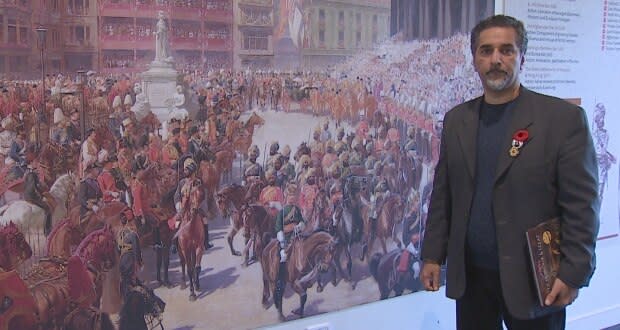Don Cherry poppy remarks an opportunity for history lesson, says WWI historian
A historian in Surrey, B.C., hopes offensive remarks made by hockey commentator Don Cherry will be an opportunity to learn more about contributions made during World War I by Indian soldiers to Commonwealth forces.
The 85-year-old Hockey Night in Canada personality said on Saturday on his weekly Coach's Corner segment that he's seeing fewer people wearing poppies to honour fallen Canadian soldiers, and he singled out those he believes are immigrants in Toronto.
The comments prompted swift backlash, and apologies the following day from his broadcaster, Sportsnet, and his co-host Ron MacLean. Today, Cherry has reportedly been fired, with Sportsnet tweeting: "It has been decided it is the right time for him to immediately step down."
"During the broadcast, he made made divisive comments that do not represent our values or what we stand for."
Steven Purewal, a historian based in Surrey B.C. and the author of a book about more than 1 million Indian soldiers sent to fight in World War I, said before news of the firing that Cherry's comments vilify new immigrants.
"What Don Cherry did was endorse a stereotype of the thankless immigrant, of an immigrant that isn't patriotic, of an immigrant that hasn't paid his way, and it's completely wrong," he said.
Listen to Steven Purewal discuss his book with the CBC's Sheryl MacKay:
On Monday, Purewal will be at the Museum of Surrey with an exhibition he created called Duty, Honour & Izzat, the same title as his book.
It highlights the role Sikh soldiers played in World War I. Izzat is a word for code of honour, central to Punjabi culture.
Purewal says the British called upon the Indian Army to help protect ports along the English Channel at the outset of World War I. Sikh soldiers also fought in Flanders Fields in the first battle of Ypres five months before the Canadian Expeditionary Force arrived.
Soldiers from the Punjab helped protect the port of Calais, a key port for the Allies to bring troops and supplies to the Western Front.
Purewal says if Punjabi soliders weren't able to maintain the port, the whole history of Canadian participation in the First World War wouldn't have taken place.
"We wouldn't have had the moment when John McCrae wrote the poem, we wouldn't have had the road to Vimy, we wouldn't have had Vimy itself, we wouldn't have had the stories around Passchendaele," he said.
"All of those would be negated because the Canadian Expeditionary Force could not have landed in France in 1915 without the help of the Punjabis."
Purewal says Punjabi soldiers were also called to assist Canadians fighting in the second Battle of Ypres. Soldiers from the two armies fought and died side by side, he said.

Purewal says 1 in 6 Commonwealth soldiers along the Western Front during World War I wore a turban.
Inclusive history
Purewal says Cherry's misguided comments are an opportunity for Canadians to learn more about the diversity of soldiers and their common sacrifices.
"I think he needs to sit across a table with someone more informed and use that platform of his to inform Canadians about the heritage of all people that served in the war," said Purewal.
His books says that 73,000 Indian troops were killed in World War I. Canada lost around 67,000 lives.

